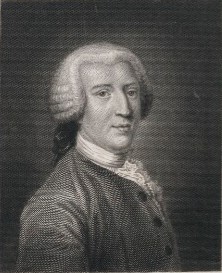Queer Places:
Eton College, Windsor SL4 6DW, Regno Unito
Linton Park, Linton, Maidstone ME17, Regno Unito
Palazzo Manetti, Via di Santo Spirito, 23, 50125 Firenze FI, Italia
St Nicholas, Linton Hill, Linton, Maidstone ME17 4AW, Regno Unito
 Sir
Horace (Horatio) Mann, 1st Baronet KB (c. 25 August 1706 – 6 November 1786),
diplomat, was a long-standing British resident in Florence. W.S. Lewis
mentions letters to Horace Walpole's
"effeminate" friends, Horace
Mann, John Chute, and
George Montagu, not to mention
Thomas Gray
and Richard West. Like letters to
Henry Seymour Conway, and like the
Countess' letters to her son, we could read these letters as a riddle and
imagine a hidden truth that Walpole has disguised in near-hysterical
friendliness. Walpole and Gray both stayed with Mann in his house overlooking
the Trinità bridge.
Sir
Horace (Horatio) Mann, 1st Baronet KB (c. 25 August 1706 – 6 November 1786),
diplomat, was a long-standing British resident in Florence. W.S. Lewis
mentions letters to Horace Walpole's
"effeminate" friends, Horace
Mann, John Chute, and
George Montagu, not to mention
Thomas Gray
and Richard West. Like letters to
Henry Seymour Conway, and like the
Countess' letters to her son, we could read these letters as a riddle and
imagine a hidden truth that Walpole has disguised in near-hysterical
friendliness. Walpole and Gray both stayed with Mann in his house overlooking
the Trinità bridge.
Mann was the second son of Robert Mann (1678–1751), a successful London
merchant, and his wife. He was brought up at Chelsea, and educated at Eton
College and later, briefly, at Clare College, Cambridge.[1]
Suffering from poor health, he travelled on the continent in the 1730s.
In February 1737, he was appointed as secretary to Charles Fane, the
British Minister at Florence.
He then served as British diplomatic representative there to the Grand Dukes
of Tuscany for the rest of his life. In the course of his long diplomatic
career, he was Chargé d'affaires in 1738-1740; Minister between 1740 and 1765;
Envoy Extraordinary from 1767; and finally Envoy Extraordinary and
Plenipotentiary from 1782 until his death.[3]
As Great Britain had no diplomatic representation at Rome, Mann's duties
included reporting on the activities of the exiled Stuarts, the Old Pretender
and the Young Pretender.
Mann kept an open house for British visitors at Palazzo Manetti, Florence,
inviting them for conversazione when there was no performance at the
theatre. His generosity and kindness was well known,[5]
although his close friendship with the painter
Thomas Patch (expelled
from Rome after a homosexual incident) reflected on his reputation.[6]
He met Horace Walpole
(to whom he was distantly related[7])
in 1739, and conducted a now-renowned correspondence with him over forty
years, though they last met in 1741. The correspondence was published by Lord
Dover in 1833.
.JPG)
Palazzo Manetti, Florence, Italy
In recognition of his service he was created a baronet on 3 March 1755.[8]
and made a Knight of the Bath on 26 October 1768.
(when his nephew Horace stood proxy).[6]
In 1775, on the death of his elder brother, Edward Louisa Mann, he inherited
the Linton Park estate which his father had bought at Linton, Kent.
He died unmarried in Florence on 6 November 1786. His nephew Horace
inherited his baronetcy by special remainder and also acted as Chargé
d'affaires until the arrival of his replacement.[3]
My published books:


BACK TO HOME PAGE

- https://en.wikipedia.org/wiki/Sir_Horace_Mann,_1st_Baronet
- Men in Love, Masculinity and Sexuality in the Eighteenth Century, by
George E. Haggerty
- Homosexuals in History, A Study of Ambivalence in Society, Literature
and the Arts, by A.L. Rowse, 1977
 Sir
Horace (Horatio) Mann, 1st Baronet KB (c. 25 August 1706 – 6 November 1786),
diplomat, was a long-standing British resident in Florence. W.S. Lewis
mentions letters to Horace Walpole's
"effeminate" friends, Horace
Mann, John Chute, and
George Montagu, not to mention
Thomas Gray
and Richard West. Like letters to
Henry Seymour Conway, and like the
Countess' letters to her son, we could read these letters as a riddle and
imagine a hidden truth that Walpole has disguised in near-hysterical
friendliness. Walpole and Gray both stayed with Mann in his house overlooking
the Trinità bridge.
Sir
Horace (Horatio) Mann, 1st Baronet KB (c. 25 August 1706 – 6 November 1786),
diplomat, was a long-standing British resident in Florence. W.S. Lewis
mentions letters to Horace Walpole's
"effeminate" friends, Horace
Mann, John Chute, and
George Montagu, not to mention
Thomas Gray
and Richard West. Like letters to
Henry Seymour Conway, and like the
Countess' letters to her son, we could read these letters as a riddle and
imagine a hidden truth that Walpole has disguised in near-hysterical
friendliness. Walpole and Gray both stayed with Mann in his house overlooking
the Trinità bridge..JPG)

